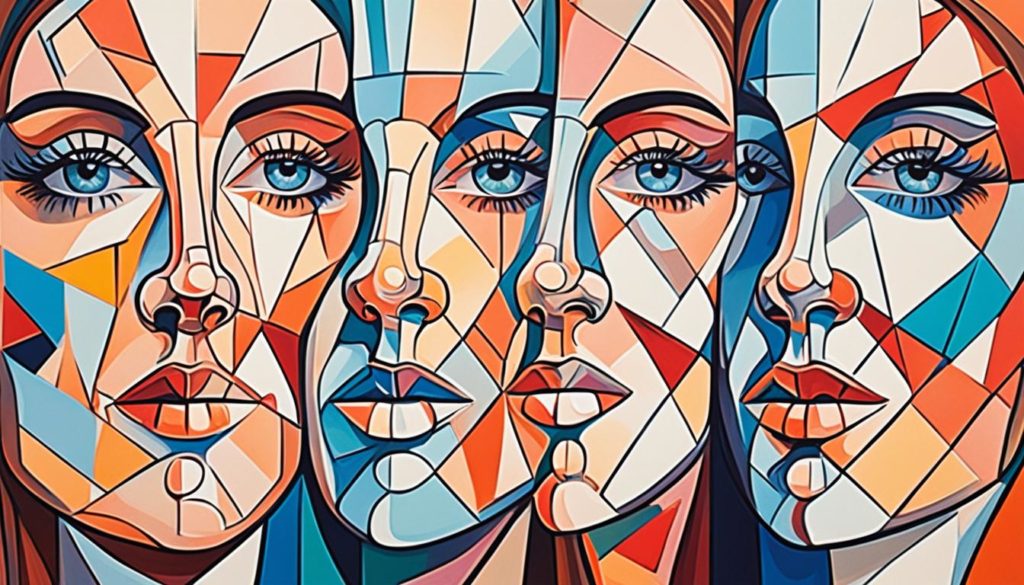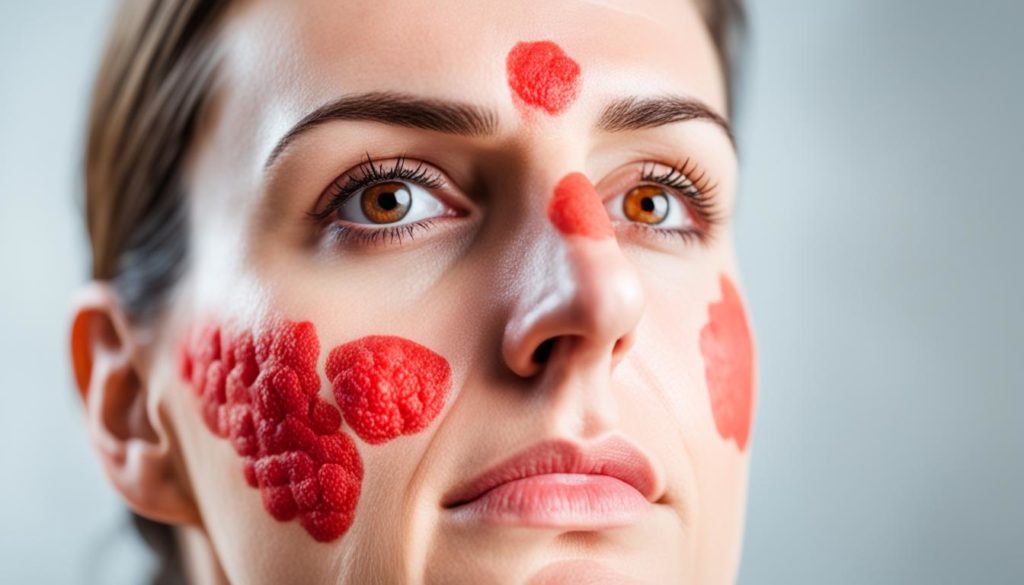About 50 million Americans struggle with acne every year. This makes it the top skin issue in the United States. Understanding its causes and finding effective treatments are vital.
Acne affects people of all ages, not just teenagers. This piece looks at the various reasons behind acne. It covers hormonal imbalances, genes, and how we live. We’ll also talk about how diet and new skincare solutions can help.
By diving deep into acne’s causes and solutions, you’ll learn how to better care for your skin. We aim to clear up myths about acne and show you how to beat it. Let’s uncover the truth about acne together.
Key Takeaways
- Acne impacts approximately 50 million Americans each year, highlighting its prevalence.
- Exploring the underlying causes of acne is essential for effective management.
- Hormonal changes, genetics, and lifestyle choices are significant contributors to acne.
- Understanding the influence of diet can aid in developing personalized acne prevention strategies.
- Staying informed about the latest treatments ensures access to the most effective solutions.
- Comprehensive acne care involves a multi-faceted approach, incorporating both medical and natural remedies.
What Is Acne?
Acne is a skin issue that many people face worldwide. It shows up as different types of blemishes. These can range from mild to severe.

Definition of Acne
Understanding acne definition helps us recognize it better. It’s mainly due to blocked hair follicles and oiliness. This leads to pimples, blackheads, and whiteheads appearing mostly on the face, neck, chest, and back. The issue can cause distress and often needs treatment.
Types of Acne
Acne comes in various types, each differing in severity and look. The most seen types include:
- Comedonal Acne: Features blackheads and whiteheads due to clogged pores.
- Inflammatory Acne: Includes papules and pustules, showing as red, swollen spots.
- Nodular Acne: A tougher kind, showing as big, painful bumps under the skin.
- Cystic Acne: The most serious kind, with deep, pus-filled cysts that can scar a lot.
Knowing these types helps figure out the right treatment for each.
| Type of Acne | Characteristics |
|---|---|
| Comedonal Acne | Includes blackheads and whiteheads; involves clogged pores. |
| Inflammatory Acne | Includes papules and pustules; red and swollen areas. |
| Nodular Acne | Severe, large lumps beneath the skin; painful. |
| Cystic Acne | Deep, pus-filled cysts; potential for significant scarring. |
Common Causes of Acne
We explore the main factors that lead to acne. These include hormonal changes, our genes, and our lifestyle and diet choices. Each plays a role in acne breakouts.

Hormonal Changes
Hormonal acne causes are significant. This is because hormonal shifts, like during puberty, pregnancy, or menopause, increase oil production. More oil can mean more clogged pores and more acne.
Genetic Factors
Our genes play a part in acne too. If your parents had acne, you might be more likely to have it as well. It’s about how your skin reacts and how much oil it makes. Some of us are just more likely to get acne.
Lifestyle and Diet
Your lifestyle and what you eat affect acne too. Stress, not enough sleep, and unhealthy foods can make acne worse. Living healthy and eating balanced meals can lower the risk. It’s important for managing acne.
Hormonal Acne Causes
Hormonal acne primarily comes from hormone changes, especially androgens. These changes can increase oil production and raise acne chances. Knowing how hormones affect acne is key for people dealing with it.
Influence of Hormones
In both genders, hormonal changes lead to more sebum. This oil can cause acne. Androgens like testosterone make oil glands larger and increase oil. This results in clogged pores and acne.
Big hormone changes happen during puberty, menstruation, pregnancy, and menopause. These times are major acne triggers.
Common Triggers
The common triggers for hormonal acne vary across different life stages:
- Puberty: Increased androgen levels stimulate sebaceous glands.
- Menstruation: Hormonal fluctuations can cause cyclical breakouts.
- Pregnancy: Changes in hormones, especially in the first trimester, can trigger acne.
- Menopause: Decreasing estrogen levels relative to androgens can induce acne.
Knowing these triggers and their connection to life stages helps manage hormonal acne’s effects. It’s important to tackle these hormonal acne causes for better understanding and control.
Breakout Triggers: What to Watch For
Knowing what causes acne to flare up is key to controlling it. Stress can lead to more oil on your skin and blocked pores. Try adding yoga or meditation to your day to fight stress.
Some medicines, like corticosteroids and birth control, might cause acne. If you think your medicine is making your skin worse, talk to your doctor about other options.
Pollution and humidity are bad for your skin too. They can fill your pores with dirt and make your skin oily. Use skincare products that protect you from these things.
Be careful when choosing makeup and skincare products. Some have ingredients that can cause pimples. Always choose products labeled non-comedogenic to keep your pores clear.
To prevent acne, it helps to know and avoid what causes it. Keeping things that touch your face clean, like pillowcases and phones, can lower your chances of getting pimples.
Effective Acne Treatment Options
Finding the right acne treatment can change your life if you have acne. We’ll look at many solutions, from simple over-the-counter options to stronger prescriptions. It’s important to know the difference between creams you put on your skin and pills you take.
Over-the-Counter Treatments
Many start with over-the-counter products for mild to moderate acne. These include ingredients like benzoyl peroxide, salicylic acid, or AHAs. They work in different ways to fight acne by killing bacteria, removing dead skin, or opening pores.
- Benzoyl Peroxide: An antibacterial agent that reduces acne-causing bacteria.
- Salicylic Acid: Helps to exfoliate the skin and unclog blocked pores.
- Alpha Hydroxy Acids: These acids help to remove dead skin cells and promote new skin growth.
Prescription Medications
If acne is severe, you might need prescription medication. Dermatologists can offer stronger options like oral antibiotics or hormones to tackle tough acne. These treatments target the deep causes of acne, like bacteria, oil, or hormones.
- Oral Antibiotics: Used to reduce inflammation and kill bacteria.
- Hormonal Treatments: Often prescribed for women to address hormone-related acne.
- Retinoids: Effective for preventing clogged pores and reducing inflammation.
Topical vs. Oral Treatments
Deciding between topical and oral treatments depends on your acne and skin type. Topical treatments are creams and gels for the skin’s surface. Oral treatments are taken by mouth to fight the acne from inside.
| Topical Treatments | Oral Treatments |
|---|---|
| Applied directly to the skin | Ingested and work internally |
| Suitable for mild to moderate acne | Ideal for moderate to severe acne |
| Fewer systemic side effects | Potential for systemic side effects |
Picking the right treatment means understanding all the options, plus their pros and cons. By looking into effective acne treatments, you can choose wisely. This way, you’re on the path to clearer skin.
Natural Remedies for Acne
Many people struggle with acne. For a holistic approach, natural remedies for acne offer great alternatives. These include herbal solutions and changes in diet to help control acne.
Herbal Solutions
Herbs have been part of skincare because of their healing properties. Some herbal acne solutions are effective in reducing acne naturally:
- Tea Tree Oil: With its antibacterial properties, tea tree oil can reduce acne-causing bacteria.
- Aloe Vera: Aloe vera is great for calming inflammation and healing the skin.
- Green Tea Extract: Green tea, full of antioxidants, helps in cutting down sebum and inflammation.
Dietary Adjustments
What you eat greatly affects your skin. Making certain dietary adjustments for acne can help:
- Low Glycemic Diet: Eating foods like whole grains and veggies, with a low glycemic index, aids in controlling blood sugar and reduces acne.
- Omega-3 Fatty Acids: Omega-3, found in fish, flaxseeds, and walnuts, reduces inflammation in the body.
- Antioxidant-Rich Foods: Fruits and vegetables rich in antioxidants protect the skin and help in healing acne.
| Herbal Solution | Benefits for Acne |
|---|---|
| Tea Tree Oil | Anti-bacterial, reduces acne-causing bacteria |
| Aloe Vera | Soothing, reduces inflammation |
| Green Tea Extract | Antioxidants, reduces sebum production |
| Omega-3 Fatty Acids | Controls inflammation |
| Antioxidant-Rich Foods | Protects skin, aids healing |
Adding these natural remedies for acne to your care routine can support traditional treatments. They promote healthier skin overall.
Acne Causes and Treatments
It’s key to understand acne to treat it well. The causes and treatments of acne include hormones, genes, and how you live. Finding the right treatment helps avoid scars or the acne coming back.
Knowing what triggers your acne is the first step. Medicines can help with hormonal changes. For mild acne, over-the-counter options work, while tougher cases might need a doctor’s prescription. Knowing more about acne allows skin doctors to choose the best treatment, whether it’s creams or pills.
Using a mix of treatments often works best. Adding natural methods, like changing your diet or taking herbs, can boost what the doctor prescribes. This way, the treatment addresses all aspects.
Treating acne well means really understanding its causes and all the ways to tackle it. A plan that’s just for you is the best way to beat this common skin issue.
Best Acne Treatments Available Today
Finding the best acne treatments is hard with so many options. This section looks at top products and new treatment tech.
Top Products Reviewed
Salicylic acid and benzoyl peroxide help fight acne well. Neutrogena and Proactiv lead with products for different skin and acne types.
- Neutrogena Oil-Free Acne Wash: Known for its gentle yet effective cleansing properties.
- Proactiv Solution 3-Step System: A holistic approach targeting acne through a combination of treatments.
- La Roche-Posay Effaclar Duo: An acclaimed product featuring micronized benzoyl peroxide and lipo-hydroxy acid.
Technology and Innovation in Acne Treatment
The skin care world is seeing new innovation in acne treatment. With light and laser therapies, acne is targeted more effectively. Topical meds like retinoids and azelaic acid are changing how we treat acne.
Blue light therapy fights acne-causing bacteria. Chemical peels and extractions clean skin deeply. Severe acne finds a strong ally in isotretinoin, showing the wide range of treatments. For an in-depth look, check reputable sources on top acne products.
The mix of old and new treatments offers hope for clear skin. Whether you choose OTC options or the latest tech, what matters is matching treatment to your skin and acne type.
Impact of Diet on Acne
Understanding how diet affects acne is crucial for those with this skin problem. Studies show the foods you eat can really impact your skin’s health and acne. This is known as diet-related acne, showing a clear link between what we eat and skin outbreaks.
Some foods may make acne worse. For instance, high-glycemic-index foods like white bread and sugary snacks can raise insulin levels. This can cause hormone changes that lead to skin problems. Meanwhile, eating foods full of antioxidants and omega-3 fatty acids, like fruits, vegetables, and fish, could help lessen acne.
Let’s look at some foods and their effects on the skin:
| Food | Impact on Skin |
|---|---|
| High-Glycemic Foods | Can increase insulin and androgen levels, potentially leading to more sebum production and clogged pores. |
| Dairy Products | Some studies suggest that dairy can exacerbate acne, possibly due to hormones present in milk. |
| Omega-3 Rich Foods | Foods like salmon and flaxseeds are anti-inflammatory, helping to calm and clear the skin. |
| Fruits and Vegetables | Rich in antioxidants and vitamins, these can help protect the skin from inflammation and oxidative stress. |
For those with acne, changing your diet can help. Eating less high-sugar and high-dairy foods and more vegetables, fruits, and omega-rich foods can improve your skin. Knowing the impact of diet on acne helps you choose better for your skin’s health.
Skincare Tips for Acne Prevention
Keeping a steady skincare routine is key for stopping acne and getting clear, healthy skin. By adding certain habits and avoiding common mistakes, you can lower the chance of pimples. Let’s go through a daily skincare plan and share important advice for your acne prevention routine.
Daily Skincare Routine
It’s crucial to have a daily skincare routine to avoid acne. Start with a soft cleanser that fits your skin type to take away dirt without making your skin too dry. Next, use a toner to keep your skin’s pH balanced. Then, put on a light, non-comedogenic moisturizer to keep your skin moist.
Using an acne treatment like salicylic acid or benzoyl peroxide can stop breakouts. And, always wear a broad-spectrum sunscreen in the daytime to protect against harmful UV rays.
Do’s and Don’ts
Knowing what to do and what not to do is important for acne prevention. Always keep your skincare simple and regular. Make sure to wash your pillowcases and towels often as they can have bacteria that cause acne. Drink lots of water and eat lots of fruits and veggies for healthy skin.
On the other hand, don’t scrub your skin too hard as it might irritate it and make acne worse. Avoid touching your face a lot because it can spread oils and bacteria. Also, don’t pick at pimples to avoid scars and more redness. By following these skincare tips, you can keep your skin healthier and prevent future acne.
FAQ
What causes acne?
Acne can come from many things. These include hormonal changes, genes, how you live, what you eat, and the environment. Knowing what causes acne is key to prevent it.
How do hormonal changes influence acne?
Hormones, especially androgens, can make your skin oily. This often leads to acne. Events like puberty, periods, pregnancy, or menopause can cause these hormone changes.
What types of acne are there?
Acne comes in types like blackheads and whiteheads, also called comedonal. Then there’s the red and swollen kinds, called inflammatory. Nodular or cystic acne is the most severe. Each type has its own way to treat it.
Can genetic factors contribute to acne?
Yes, genes matter a lot. If your parents had acne, chances are, you might too. This means you’ll need treatments that consider your family history.
What dietary changes can help manage acne?
Changing your diet can help your skin. Reduce sugar and dairy. Eat more fruits and veggies. These changes can help clear your skin naturally.
Are there effective over-the-counter treatments for acne?
Yes, many treatments are available without a prescription. You can find ones with benzoyl peroxide, salicylic acid, and alpha hydroxy acids. They work well for mild to moderate acne.
What prescription medications are available for acne?
For tough acne, doctors can prescribe strong medicines. These include creams with retinoids, antibiotics, and even contraceptives. But, they might have side effects.
What are some common breakout triggers to watch for?
Look out for stress, certain drugs, pollution, and makeup. Knowing and avoiding your triggers can help stop acne before it starts.
Are natural remedies for acne effective?
Many find natural treatments like tea tree oil and aloe vera helpful. Changing your diet can also be good. These are part of a whole treatment plan.
How does diet impact acne?
What you eat matters a lot for your skin. Foods high in sugar and fat can make acne worse. Eating healthy fats, antioxidants, and vitamins instead can help.
What are the best acne treatments available today?
Today’s top treatments include special creams, pills, and even blue light therapy. Your skin doctor will suggest the best one for you.
What should be included in a daily skincare routine for acne prevention?
For keeping acne away, clean gently, use products that don’t clog pores, moisturize, and apply sunscreen. Avoiding rough scrubs and too much washing helps too.


